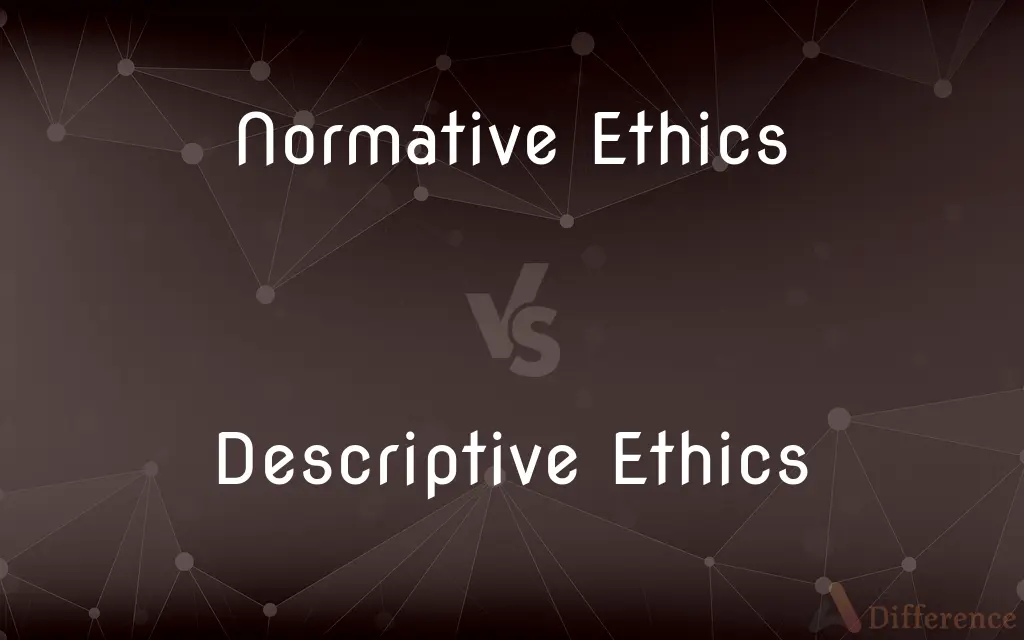Normative Ethics vs. Descriptive Ethics — What's the Difference?
By Tayyaba Rehman — Published on December 8, 2023
Normative Ethics prescribes how people ought to behave, while Descriptive Ethics describes how people actually behave in real-life situations.

Difference Between Normative Ethics and Descriptive Ethics
Table of Contents
ADVERTISEMENT
Key Differences
Normative Ethics and Descriptive Ethics are two branches of ethical study, each addressing different aspects of human morality. Normative Ethics delves into the moral standards that regulate right and wrong conduct. It concerns itself with constructing guidelines, principles, or rules that dictate how an individual should act. Descriptive Ethics, in contrast, concerns itself with empirical observation and analysis. It is focused on studying and reporting on what people believe to be moral and how they act on those beliefs.
Normative Ethics seeks to provide a framework for determining what constitutes a morally right action. Its aim is to offer prescriptive judgments, essentially stating what actions are good or bad, permissible or impermissible. On the other hand, Descriptive Ethics, being an empirical discipline, does not judge actions as right or wrong. Instead, it provides an objective account, describing and analyzing moral behaviors, beliefs, and practices that exist in various cultures and societies.
In the realm of philosophical inquiry, Normative Ethics often grapples with theories such as utilitarianism, deontology, or virtue ethics, each proposing a particular method to determine moral actions. Descriptive Ethics, while philosophical in nature, aligns closely with anthropology and sociology. It studies actual human behaviors and beliefs, helping to map out the moral landscape of different communities.
To make an analogy, if ethics were a guide to navigating the complex world of human behavior, Normative Ethics would be the compass, providing direction on which path to take. Descriptive Ethics, conversely, would be the map, outlining the terrain and showing the paths that people have already taken.
Comparison Chart
Primary Focus
Prescribes moral behavior.
Describes actual moral behavior.
ADVERTISEMENT
Nature
Prescriptive.
Empirical.
Association
Philosophical theories.
Anthropology and sociology.
Judgment
Judges actions as right or wrong.
Observes without moral judgment.
Objective
Determine what one ought to do.
Understand what people believe and do.
Compare with Definitions
Normative Ethics
Normative Ethics provides guidelines for how one should act.
According to Normative Ethics, lying is generally considered morally wrong.
Descriptive Ethics
It observes and describes moral behaviors without judgment.
Through Descriptive Ethics, researchers found that gift-giving is a universal moral practice.
Normative Ethics
Normative Ethics prescribes moral behavior.
Normative Ethics might state that charity is a virtuous act.
Descriptive Ethics
Descriptive Ethics is empirical in nature.
A Descriptive Ethics study might survey people's attitudes towards animal rights.
Normative Ethics
It deals with moral standards and principles.
Normative Ethics debates whether utilitarianism or deontology offers a better moral framework.
Descriptive Ethics
It maps out the moral landscape of societies.
Descriptive Ethics reveals that notions of modesty vary significantly across cultures.
Normative Ethics
Normative Ethics is concerned with ethical actions and their justifications.
In Normative Ethics, discussions often revolve around the morality of actions like euthanasia.
Descriptive Ethics
Descriptive Ethics studies actual moral beliefs of individuals or cultures.
Descriptive Ethics would examine why some cultures value honor over truth-telling.
Normative Ethics
It seeks to determine right from wrong.
Through Normative Ethics, scholars argue whether capital punishment is morally acceptable.
Descriptive Ethics
Descriptive Ethics aligns with anthropology and sociology.
An anthropologist using Descriptive Ethics might document tribal rituals and their moral significance.
Common Curiosities
Is Normative Ethics concerned with real-world behaviors?
While Normative Ethics prescribes how one ought to act, it doesn't necessarily describe real-world behaviors.
Can Normative Ethics change based on culture?
While some moral principles are universal, Normative Ethics can vary based on cultural and societal values.
What does Normative Ethics primarily focus on?
Normative Ethics focuses on prescribing how individuals should act morally.
Does Descriptive Ethics judge moral actions?
No, Descriptive Ethics observes and describes moral actions without making moral judgments.
How does Descriptive Ethics gather its information?
Descriptive Ethics gathers information through observing and studying actual moral behaviors and beliefs.
How do anthropologists use Descriptive Ethics?
Anthropologists use Descriptive Ethics to study and document the moral practices and beliefs of different cultures.
Can Descriptive Ethics influence Normative Ethics?
Yes, understanding actual moral practices through Descriptive Ethics can inform and influence Normative Ethics discussions.
Is lying always wrong according to Normative Ethics?
Normative Ethics debates such topics, and while many theories oppose lying, circumstances can affect judgments.
How does Normative Ethics relate to law?
While laws might reflect Normative Ethics principles, they are not always aligned, as laws can change, and ethics might remain consistent.
Does Normative Ethics have multiple theories?
Yes, Normative Ethics includes theories like utilitarianism, deontology, and virtue ethics.
Why is Descriptive Ethics important?
Descriptive Ethics helps understand the moral beliefs and practices of different cultures, aiding in cross-cultural understanding.
Are Normative Ethics and Descriptive Ethics mutually exclusive?
While they have different focuses, they can inform and complement each other in ethical studies.
Why is Normative Ethics essential?
Normative Ethics provides a framework for moral decision-making, guiding individuals and societies in ethical dilemmas.
Can Descriptive Ethics provide moral answers?
Descriptive Ethics describes moral behaviors and beliefs but doesn't prescribe what is morally right or wrong.
Share Your Discovery

Previous Comparison
Grilling vs. Roasting
Next Comparison
Unprotected Pick NBA vs. Protected Pick NBAAuthor Spotlight
Written by
Tayyaba RehmanTayyaba Rehman is a distinguished writer, currently serving as a primary contributor to askdifference.com. As a researcher in semantics and etymology, Tayyaba's passion for the complexity of languages and their distinctions has found a perfect home on the platform. Tayyaba delves into the intricacies of language, distinguishing between commonly confused words and phrases, thereby providing clarity for readers worldwide.














































